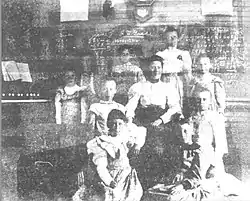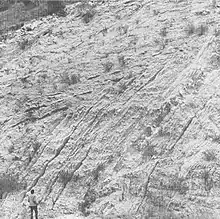Bee Rock, California
Bee Rock is a rural unincorporated community in northern San Luis Obispo County, California.[2] Bee Rock is 3 miles (4.8 km) east-northeast of Tierra Redondo Mountain, in the southeastern Santa Lucia Range.[3] It is located on Interlake Road, between Lake Nacimiento and Lake San Antonio reservoirs. It is known for having, in the 19th century, the "largest bee-hive in the world" housed within a granite boulder.
Bee Rock, California | |
|---|---|
 Bee Rock School in 1898 | |
 Bee Rock, California  Bee Rock, California | |
| Coordinates: 35°47′14″N 120°56′21″W | |
| Country | United States |
| State | California |
| County | San Luis Obispo |
| Elevation | 938 ft (286 m) |
| Time zone | UTC-8 (Pacific (PST)) |
| • Summer (DST) | UTC-7 (PDT) |
| Area code | 805 |
| GNIS feature ID | 252851[1] |

Settlement
Although Bee Rock was inhabited earlier, the Bee Rock Ranch, in 1862, was homesteaded by a family of German cobblers, the Langenbecks.[4] Elizabeth Langenbeck died in 1928. She and her husband had nine children.[5] In the 1940s Fred Langenbeck still lived in Bee Rock.[6]
In 1881, the Allen family also homesteaded in Bee Rock, it has been written that Jim Hardy Allen named the area Bee Rock.[7] In the 1940s the old Allen family Ranch in Bee Rock became the Bee Rock Lodge. Allen spearheaded the founding of the Bee Rock School in the early 1880s by organizing fund raisers attended by local families. Ernest KoneKamp, a local rancher donated an acre of land on which the school was built. The school building doubled as a community hall, and would on occasion operate as a church when a clergyman would visit the town.[7][8]
The area once held a public school (Bee Rock School), and also had a community hall (Bee Rock Hall) that operated for 26 years before it burned down in 1930.[9][10] Dances were among the events held there.[11][12]
A small branch of the San Luis Obispo County Free Library opened in Bee Rock in 1929.[13]
By 1951 the old Bee Rock School was abandoned.[14] In 1972 there was still a Bee Rock Store in operation.[15] A new Bee Rock School was built in 1972 to serve the community.[7]
The Bee Rock Fault zone passes through the community of Bee Rock.[16]
The bee rock
In the late 19th century the community became known for having the "largest bee-hive in the world." A granite boulder, located near the Arroyo Alcalde, riddled with fissures was inhabited by a "vast population of bees, and overflow[ing] with honey", producing hundreds of pounds of honey per year.[17][18][19]
References
- "US Board on Geographic Names". United States Geological Survey. October 25, 2007. Retrieved January 31, 2008.
- (19 May 1916). Bee Rock, San Luis Obispo Daily Telegram (sample of regularly reported local news items)
- Durham, David L. (1998). California's Geographic Names: A Gazetteer of Historic and Modern Names of the State. Quill Driver Books. p. 861. ISBN 1-884995-14-4.
- "History: Est. 1862". Bee Rock Homestead. Retrieved February 17, 2021.
- Barrett, Virginia (November 23, 1928). "Death Summons". King City Rustler, Vol. 29, No. 34. Retrieved February 17, 2021.
- "Bradley". Salinas Morning Post. March 29, 1940. Retrieved February 17, 2021.
- Doty, Betty Farrell (April 15, 1972). "A Parental Do-It-Yourself Project". The Californian.
- "Society". Santa Cruz Sentinel. March 31, 1940. Retrieved February 17, 2021.
- (10 October 1930). Fire Destroys Bee Rock Hall, King City Rustler
- (19 January 1912). Bee Rock District, San Luis Obispo Tribune
- "Bee Rock". No. 234. San Luis Obispo Daily Telegram. November 28, 1913. Retrieved February 17, 2021.
- "Bee Rock". No. 70. San Luis Obispo Daily Telegram. Retrieved February 17, 2021.
- News Notes of California Libraries, p. 48 (January 1930)
- "Five Visit Bee Rock". The Arooyo Grande Valley Herald Reporter. March 6, 1951. Retrieved February 18, 2021.
- Dayton, C.S. (May 24, 1972). "Hesperia, Bryson". The Californian. Retrieved February 18, 2021.
- Durham, David L. (1974). Geology of the Southern Salinas Valley Area, California (PDF). Washington DC: US Geological Survey, U.S. Government Printing Office. pp. 60–68. Retrieved February 16, 2021.
- "Notices". The Morning Journal-Courier. April 13, 1985. Retrieved February 16, 2021.
- "General News". The Weekly Standard and Express (UK). December 29, 1894. Retrieved February 16, 2021.
- U.S. Dept. of Agriculture (1948). Bibliography of Agriculture, Volume 12, Part 1. University of Illinois, Urbana-Champaign. Retrieved February 17, 2021.
